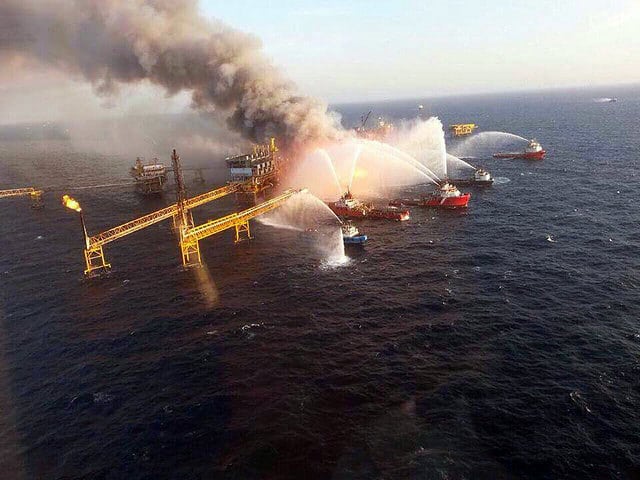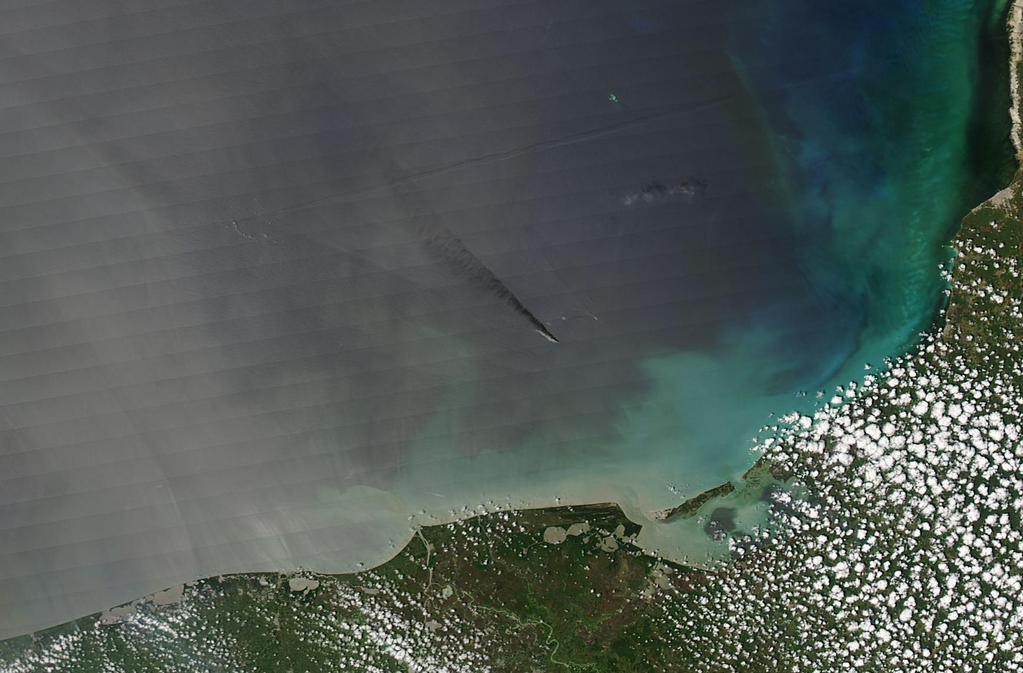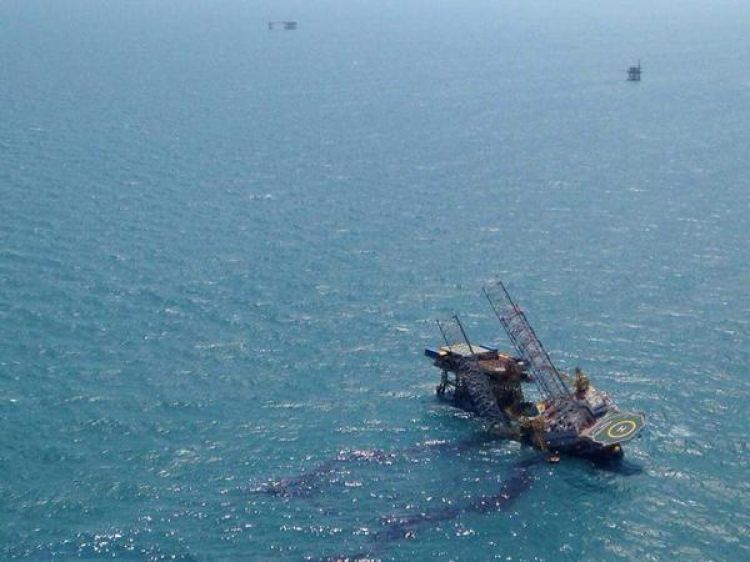It’s been a disastrous year for Pemex, the state-owned Mexican oil company at the center of the nation’s landmark energy reforms.
In just over a month, Petroleos Mexicanos (Pemex) starred in three tragic incidents, two fatal.
These incidents, argues Gustavo Ampugnani, lead energy and climate campaigner for Greenpeace Mexico, foreshadow worsening oil- and gas-related disasters as the country’s massive energy reforms open Mexico’s vast fossil fuel reserves up to international companies that are even less regulated and scrutinized than State-owned Pemex.
Explosion in the Gulf
On April 1st, an explosion rocked the company’s Abkatun-A Permanente platform, engulfing the rig in flames. The massive fireball and subsequent blaze sent hundreds of Pemex contractors into the sea. Nearly two months later, we know that four workers were killed, at least 16 were injured, and three are still missing, now presumed dead. Survivors described a terrifying scene, as crew members “jumped into the sea out of desperation and panic.”
Roger Arias Sanchez, an employee of Pemex contractor Cotemar, told the Associated Press that, “there was nothing you could do but run.”
With the 5-year anniversary of the massive Deepwater Horizon oil spill in the Gulf just behind us, Pemex and the Mexican government quickly clamped down communications about the disaster in the oil-rich Campeche Sound shallow water offshore region, offering optimistic, blue sky commentary about the severity of the incident, and the extent of any potential spill and pollution.
The company announced by Twitter the night of the explosion that the fire had been extinguished after 16 hours.
Pemex then assured the public that because Abkatun-A is a shallow-water platform that largely separates oil from gas—not a drilling platform—supply lines were quickly shut down, and an oil spill was avoided.
In a statement the day after the explosion, Pemex said the fire “did not cause an oil spill into the sea, given that there was only a seepage, which is being taken care of by specialized vessels.” It suggested the oil remaining in the pipelines was burning off.
However, satellite imagery taken the day after the explosion, released by Greenpeace Mexico, reveals an oily sheen stretching at least two and a half miles from the smoldering platform.
Photo credit: Greenpeace
Carlos de Regules Ruiz-Funes, executive director of the Security, Energy and Environmental Agency (ASEA) acknowledged an oil slick “of at least four kilometers long and a few millimeters thick.”
When Greenpeace Mexico asked the state-owned company to access the Abkatun platform area to independently assess the environmental impacts, the organization hit a brick wall.
“The only response has been [Pemex’s] refusal to give Greenpeace, an independent environmental organization, the capability to document and witness the real situation at the platform,” said Gustavo Ampugnani, an energy and climate director for Greenpeace Mexico.
“Pemex has proven time and time again that you cannot trust their statements. Their lack of transparency and their obvious attempts to downplay the extent of the damage only emphasize the urgent need for an independent evaluation of the site,” said Ampugnani.
Back to Business as Usual
Though losses from the explosion were recently announced to reach between $670 and $780 million, company spokespeople have emphasized that their oil production will not suffer.
And, in fact, within two weeks of the explosion, the Abkatun complex — of which Abkatun-A is one of six platforms — was feeding crude to onshore refineries again, and a Pemex spokesman announced confidently last week that all 2015 production targets would be met.
As for the environmental impacts of the fire and disputed spill, nearly two months have passed and little more is known publicly than the days immediately after the explosion.
The Abkatun fire in the Campeche Sound, as seen from space. Photo credit: NASA.
Greenpeace Mexico’s requests to visit the site were repeatedly denied. And to date, no other organization independent of the Mexican government or of state-owned Pemex have been able to study or assess the impacts of the Abkatun fire.
The Mexican government announced that it’ll be four to eight months before we know how the explosion actually happened. That means four to eight months before the lessons can be learned from Abkatun to prevent a similar tragedy from occurring again.
Pipeline spill leaves half a million thirsty
Barely two weeks after the fire in the Gulf, Pemex was reeling from another “incident.” After oil thieves punctured a hole in a Pemex-operated pipeline, oil spilled into three rivers in and around Villahermosa, the capital of the state of Tabasco. Authorities immediately shut down four water treatment plants—all fed by the oil-polluted Sierra, Teapa, and Grijalva Rivers — immediately cutting water supplies to half a million residents of Villahermosa.
While water services were restored within a week to residents, the extend of the environmental damage to the rivers is yet unknown. Carlos de Regules Ruiz-Funes of the Security, Energy and Environmental Agency (ASEA), said he hopes that their investigation will be complete within a few weeks.
Fuel theft like that which caused this spill has become so rampant in Mexico that earlier this year, Pemex announced plans to only ship partially-refined fuels, and no diesel or gasoline ready for public use. Over 3,600 illegal taps had been plugged into Pemex’s pipelines in 2014, up 66 percent from a year earlier. The new policy will help prevent smaller-scale threats, but larger illegal fuel trading operations, typically run by drug gangs and other organized crime groups, won’t likely be deterred by partially-refined fuels.
No accountability
On May 5, a rig operated by a Pemex contractor collapsed in the Bay of Campeche, the most active and productive area of offshore oil in Mexico. Two workers aboard the Troll Solution rig were killed, and the number of injured workers is contested. Typhoon Offshore, the contractor, has reported that 10 workers were injured, while local media claims a toll 28 injured workers.
And though the company has claimed that no oil had spilled from the platform, aerial images posted to Twitter show dark streaks in the water coming from the tilting rig.
The Troll Solution rig, operated by Typhoon Offshore for Pemex, lists and leaks a fluid that the company claims is not oil. Two workers were killed in the accident, and the number injured is contested. Credit: Jose Luis Hernández
There seems to be little accountability for either of the Gulf accidents or the spill in Tabasco. Government authorities say they are still investigating all three. Though Pemex’s state-owned status complicates the investigations, which local environmental groups dismiss as public relations.
The only certainty, local campaigners argue, is that the two accidents show the threats posed by the oil industry to the Mexican public. Threats that only stand to increase in the wild west of post-reform Mexican energy.
“Energy reform will enhance these [negative] impacts and contribute to worsening climate change,” said Ampugnani, “in the blind quest for more oil, which causes contamination of land, rivers, seas and the air of our cities.”
Top image credit: Greenpeace.
Subscribe to our newsletter
Stay up to date with DeSmog news and alerts










